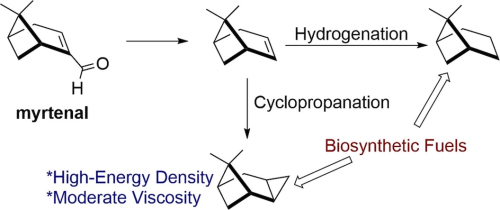A paper describing their work using myrtenal—a naturally occurring molecule (a bicyclic monoterpenoid, C10H14O)—is published in the journal Fuel. Myrtenal can be found in a wide variety of common spices including cumin, rosemary and coriander as well as hyssop, lavender, and the essential oils of orange, lemon, peppermint, juniper, ginger and parsley.
Biology provides a diverse array of structural motifs that can be leveraged for the synthesis of alternative fuels. In particular, strained ring systems including cyclopropyl and cyclobutyl groups are common in monoterpenes and impart desired properties including increased density and heat of combustion while limiting increases in viscosity. Recent work has shown that chemoselective hydrogenation of ring-strained monoterpenes is an effective strategy for the generation of high-performance fuels. Alternatively, the alkenes can be easily converted to cyclopropane rings, which further enhances the density and volumetric heat of combustion (NHOC) of these hydrocarbons.
One key target of alternative fuel development is JP-10, a synthetic fuel currently used for missile propulsion, which is primarily composed of exo-tetrahydrodicyclopentadiene. JP-10 is a remarkable fuel that combines a high density (0.935 g/mL) with an exceptionally low freezing point (−79 °C) and a moderate viscosity (8.8 mm2 s−1 at −20 °C; 18.8 mm2 s−1 at −40 °C).
Researchers have recently described chemical pathways to JP-10 from bio-based substrates including furfuryl alcohol and furfural. In contrast, viable biosynthetic routes that combine fermentation with chemical catalysis to generate fuels with comparable thermodynamic and viscometric properties to JP-10 have been unsuccessful.
… To achieve even higher densities from bio-based molecules while keeping the viscosity low it became of interest to study a C9 multicyclic bio-based molecule with one alkene available for cyclopropanation. Upon addition of a methylene group, the resulting molecule would have 10 carbons, similar to JP-10, which we hypothesized would result in a lower viscosity fuel. One promising molecule identified in the course of our research was apopinene, a 9-carbon molecule exhibiting a bicyclic structure with a 6-membered ring bridged by a cyclobutane ring. Apopinene can be readily synthesized from myrtenal by a reactive distillation process which liberates carbon monoxide.
—Garrison et al.
The China Lake team synthesized two different saturated fuel molecules produced by either hydrogenation or cyclopropanation of apopinene. Hydrogenation of apopinene generated dihydroapopinene; Simmons-Smith cyclopropanation generated exo-(1R,2R)-7,7-dimethyltricyclo[4.1.1.0]octane (cyclopropanated apopinene, CPA).
The team then evaluated key fuel properties including density, heat of combustion, and low temperature viscosity.

Garrison et al.
The researchers found that CPA exhibited a density of 0.918 g mL−1 and a volumetric net heat of combustion (NHOC) 20% higher than the lower limit for conventional jet fuel. This “exceptional” NHOC is a result of the high density of the tricyclic compound and the ring strain of the bridging cyclobutane and fused cyclopropane groups.
On the other hand, dihydroapopinene exhibited a high freezing point that will limit its applications as a jet fuel blendstock. In contrast, no freezing point down to −80 °C was observed for CPA via differential scanning calorimetry (DSC). In addition, CPA exhibited a moderate kinematic viscosity of 10.11 mm2 s−1 at −20 °C and 22.76 mm2 s−1 at −40 °C.







